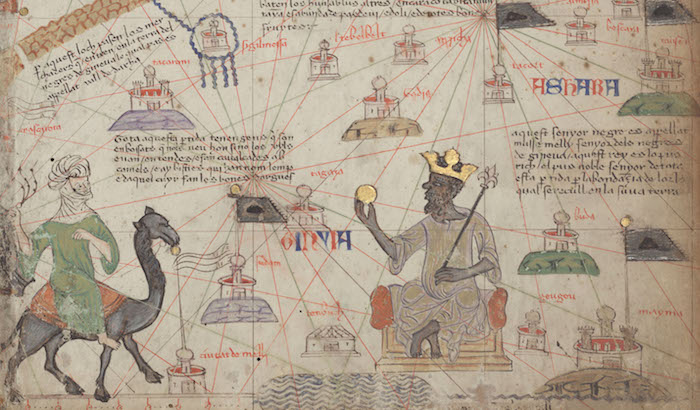From the 8th century to the late Middle Ages, the West African savanna was a gold-producing region for the distant Mediterranean. Vast sums of metal flowed along sinuous trade routes into the Islamic world and Europe. As the gold traveled, the merchants carrying it knew less and less about the source of this wealth. By the time it arrived in trade hubs like Cairo or Venice, the tales told of the source of the gold were tall indeed! Let’s follow these rumors and see how they can inform a recurring problem in RPGs: making long-distance travel feel meaningful.

The source of the gold was small mines near the upper Senegal and Niger rivers, in what is today the nations of Guinea, Senegal, and Mali. These mines were small-time operations. During the dry season, when there wasn’t much farming work to do and the water table was low, locals would dig pits in the earth. A few meters down, where the soil met the bedrock, they found small flakes of gold. They continued these shafts horizontally, supported by unexcavated pillars of stone and soil. The take wasn’t much: less than a gram of gold a day. But it was a nice supplemental income when there weren’t crops to tend.
These farmer-miners sold their gold to an amorphous group called the Wangara. The Wangara were/are somewhere between a loose brotherhood of merchants and an ethnic group. They funneled the gold north through their trading networks to the great kingdoms of the African Sahel: Mali and Ghana (no relation to the modern nation of Ghana). The kingdoms took their cut in taxes, but the greatest profit belonged to the Wangara.
This is where the legends start to come in. The Wangara didn’t want northerners to know where the gold came from. What if Ghana or Mali decided to conquer the gold-producing regions and seize the trade for themselves? So the Wangara told tales, like how when Islam moved into a region, gold stopped being found in the earth. We can’t know whether the stories had an effect, but both Ghana and Mali were Muslim kingdoms, and neither ever invaded the gold fields.

On the northern periphery of Ghana and Mali, the gold passed into the hands of Arab merchants. Here, we get another tall tale: that of the silent trade. It probably never happened, but Arab contemporaries still breathlessly repeated it.
In the silent trade, one party lays out their wares in neutral territory, then goes and hides. An interested buyer comes by, lays bars of gold on the ground beside the wares, then goes and hides. Then the first party comes back. If they like the offer, they take the gold and leave the goods. If they don’t, they may take neither, or take back some of the goods to make the offer ‘fair’. The haggling goes on like this without either party ever seeing the other.
Eventually, the gold reached Morocco, and from there the rest of the Islamic world (and Europe). As the gold got farther from its source, information about it got muddier. An Abbasid geographer writing around 900 said the gold was mined in Ghana, which it definitely wasn’t. Fifty years later, a Persian geographer said it was mined in Morocco, which was even less true.
And there was the tale that gold grew in the ground like carrots. This idea may have originated with the Wangara, looking to protect their sources. Or it may have been an invention of the Arab caravaners, trying to make their product seem fantastical and valuable. As late as the 14th century, educated men in Cairo believed that plants in “the land of the blacks” had golden roots, and people there could dig holes and pull up gold as if it were gravel.

So as the gold flows, so too do stories about it. This is perfect for RPGs! I’ve written before about the problems associated with making long-distance travel feel both real and meaningful. If a two-month road trip flashes by in two sentences of exposition, it feels like teleportation. And the single random encounter doesn’t help much with that. But spreading wild stories about where you’re coming from turns a long trip into a memorable play experience!
If your PCs are traveling from a place they want to protect (like the West African goldfields – or their home star system), they can tell increasingly fantastical stories about their point of origin as they go. Not the sort of stories that might draw the curious, but the sorts of stories that keep people away, like the Wangara told.
You can turn this into a competition. An NPC traveling companion prompts the PCs to all put $100 in the pot. Whoever tells the most effective story wins it all! And remember: a memorable story is one that will be re-told, so fantastical is good as long as it doesn’t cross over into implausible. A different PC can spin a different tale at every major stopping point on the journey. Between each spaceport or caravanserai, present an obstacle or challenge that introduces something important about the next stopping point. That way, the PCs will know some of the local beliefs, and the player on deck can tailor her story accordingly. At the end of the journey, the players vote on which character wins the pot!
–
Source: The Golden Rhinoceros: Histories of the African Middle Ages, by François-Xavier Fauvelle (2018)






